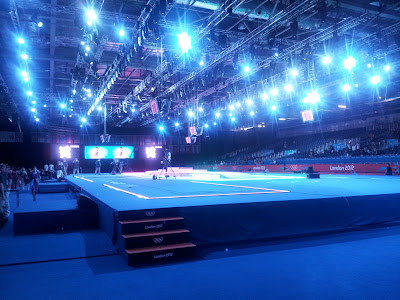
(This post was written a couple of weeks ago. What I will add is good luck to Paralympics GB, and especially to the Paralympic GB Fencers, who kick off on Tuesday.)
Today the London Olympics draws to a close, and shortly we will all be required to return to the normality and humdrum of everyday life. The whole Olympics has been a rather surreal experience, with people honestly (and with gusto) celebrating top sport and achievement for a two week period. I was down there, doing my small bit as a GamesMaker for the fencing event, one small cog in a huge machine – volunteers did so much in the games, and in many ways contributed quite a way towards the atmosphere of the games.
I’ve now worked as a volunteer for a number of large competitions – I was a frame handler for the Europeans, I did my current role for the Olympic test event and now I’ve done the big one. I am constantly impressed by the way volunteers will work through long shifts, occasionally crappy treatment, food that makes prison meals seem tasty, and do it all with a grin on their faces and a willingness to do it all again. It’s quite a euphoric experience, and one that’s worth repeating.
As a fencing coach, the amount of data my tiny little brain collected was huge. Its been hugely interesting to sit and listen to coaches and fencers of different countries, how they handle the environment, advice given during the breaks, even down to how the coach presents themselves in front of the fencer. The physicality of modern fencing can’t be communicated over a television broadcast, to get the full appreciation you have to be there in person and there’s no better seat that ten feet away in the athlete pen. I genuinely believe that this is information that can only be gained first hand by being there. We should be sending coaches to major tournaments in bus-loads, pointing all this out and screaming “that is how you do it”.
Some of the highlights for me included: * Sczlagi providing a masterclass in sabre fencing in the men’s individual final. Near perfect technique, and a dominating physical presence. * Limardo Gascon showing that height is not the be-all and end-all at épée. Given brains and technique, you can outwit a physically dominant opponent. * Piasecki (Limardo’s opponent in the final) showing that it doesn’t matter if you’re fencing the world number 1, you can still beat them (this happened repeatedly over the week, but Piasecki managed to do it repeatedly to the final, with a very straightforward style). * South Korea dominating everyone in the mens team sabre. Simple fencing, done really well. * Watching Baldini get hit in preparation by his Korean clone, Choi (this does not happen often). * Watching GB “worry” Italy in Men’s Team Foil, with a score of 40-45.
Shin’s semi-final fight was a case study and hopefully the FIE will learn lessons from the experience.
Europe has had a bit of a shake-up. France went home empty handed, Italy dominated women’s foil but had trouble in the men’s foil and sabre, and most of the expected individual finalists went out in the first round. Asian and South American fencers are no longer second class citizens, South Korea in particular stands out for taking two golds, a silver and three bronzes. As was pointed out at the time, these countries aren’t necessarily doing anything revolutionary. There is an absolute resolution and hunger present in these fencers, they’re fencing in a mostly European style, but they’ve introduced another level of fitness and physicality in to the fights that Europe is struggling to match. This is good for the sport, it gives the European countries a shake-up and tells them they need to do something new, that their existing methodologies are good but we now need something more.
I’ve not in all of this, mentioned much about TeamGB fencers. There was a lot of controversy surrounding the selections for the Olympics, which I understand, if do not entirely agree with. We failed to meet our objectives in the individual events but then, so did lots of other countries. The team events proved better, but we are still a long way from medal potential at the Olympics. There are calls for the head of the Performance Director, and the CEO was already leaving post-games (there’s a lot of good noise being made about his replacement from British Cycling). We also appear to be losing our president, Keith Smith, who will most definitely be missed. Since we missed all of our individual targets (our teams made last eight), funding is also uncertain. It’s certain we are going to experience some significant changes in British Fencing over the next few years, hopefully for the better.
On a personal note, I am extremely grateful to have had the opportunity to be a part of the Games. It’s been a great privilege to be part of such a fantastic event, and work with such an incredible team. It’s an opportunity that wont probably happen again in my lifetime and I’m extremely grateful to those that have helped make it happen, when it so nearly didn’t.
 There are no ads on this blog and as far as I can remember, never have been.
There are no ads on this blog and as far as I can remember, never have been.